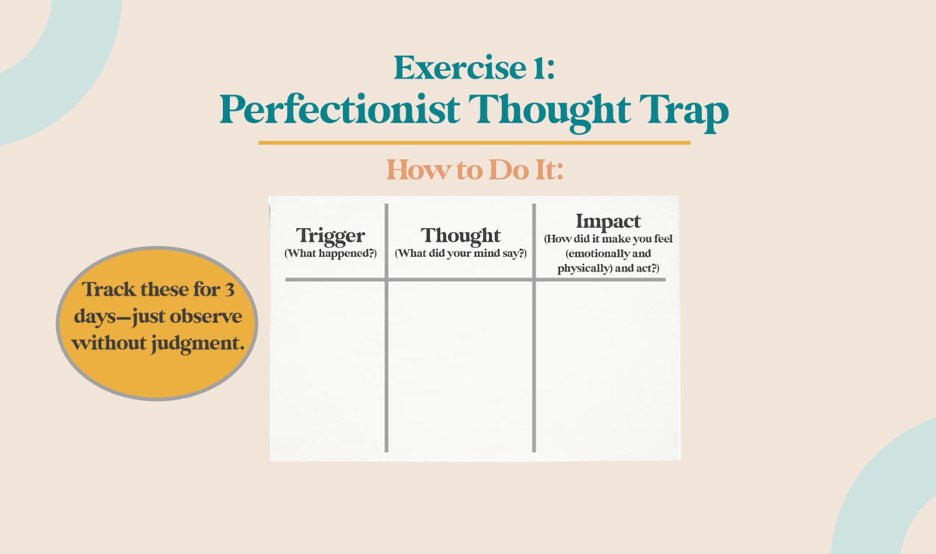July 16, 2025
Perfectionism and Self-Compassion: 3 Exercises to Ease the Pressure on Yourself

Perfectionists, this one’s for you. If you’re tired of letting perfectionistic thoughts keep you stuck, it’s time to take action. In this blog, we’ll explore perfectionism and self-compassion and share three practical exercises to help you move forward with kindness and clarity.
According to Dr. Kristen Neff, an expert on self-compassion, self-compassion isn’t just about “being nice” to yourself—it’s a powerful tool for improving overall well-being. Research shows that practicing kindness toward yourself can also reduce psychopathology, including anxiety and depression (Neff, 2023).
If you prefer to watch videos, check this one below. If not, keep scrolling to continue the blog.
What is Self-Compassion?
Self-compassion is the practice of treating yourself with the same kindness and understanding you’d offer a dear friend. Dr. Kristin Neff, who pioneered research on this concept, highlights three core elements of self-compassion:
- Self-kindness: Being gentle with yourself instead of overly critical.
- Common humanity: Recognizing that everyone makes mistakes and struggles—it’s part of being human. And through these challenges and struggles, it can serve as a reminder of connection to your fellow humans.
- Mindfulness: Observing your thoughts and emotions without judgment or over-identification.
Unlike self-esteem, which often relies on comparing yourself to others, self-compassion is unconditional. It’s about embracing your imperfections as part of what makes you, you.
Exercise 1: Perfectionist Thought Trap
Perfectionistic thoughts often stem from unrealistic expectations and fear of failure. By becoming aware of these thoughts, you can reduce their power and shift your response.
How to Do It
- Take a blank sheet of paper and create three columns:
- Trigger: What happened?
- Your Thought: What did your perfectionistic thoughts say?
- Impact: How did it make you feel or act?
- Track these for three days—just observe without judgment.
- At the end of each day, review your notes and ask yourself:
- “Is this thought helping me or holding me back?”

Example
- Trigger: Missed a deadline.
- Thought: “I’m so irresponsible. I can’t believe I dropped the ball on that. I’m such an idiot!”
- Impact: Felt anxious, shame, and procrastinated on the next task.
This exercise can help you notice how pervasive this pattern is and how much of an impact listening to or engaging with all of these thoughts has on your life, mood, and energy.
Exercise 2: The Self-Compassion Needs Check-In
Perfectionists often ignore their own needs, but unmet basic needs can amplify stress and anxiety. This is a mindful self-compassion exercise designed to help perfectionists identify their unmet needs, take actionable steps to meet them, and shift their focus from “deserving” to self-support. It reframes self-compassion as a practical skill rather than something you “earn” by being perfect.
How to Do It
- Pause and Reflect:
- Find a quiet moment to ask yourself:
- “What am I feeling right now?” (e.g., stress, overwhelm, sadness).
- “What might I need in this moment?” (e.g., rest, connection, reassurance).
- Acknowledge that these needs are valid, regardless of whether you feel you “deserve” them.
- Find a quiet moment to ask yourself:
- Define Behaviorally:
- Translate your needs into specific, actionable steps:
- Example: “I need rest” becomes “I’ll take a 10-minute break and drink water.”
- Example: “I need reassurance” becomes “I’ll text a friend and share how I’m feeling.”
- Translate your needs into specific, actionable steps:
- Focus on Function:
- Focus on what works rather than how it looks:
- Example: If your need for quiet time includes 10 minutes of mindlessly scrolling on IG, instead of judging yourself for this need, honor what you need.
- Focus on what works rather than how it looks:
Example
- Feeling: Overwhelmed after a long workday.
- Need: Rest and mental clarity.
- Behavioral Action: Take a 10-minute walk outside or spend 5 minutes journaling to process thoughts.
Keep in mind that if you’re not used to meeting your needs, it might feel awkward, vulnerable, or have judgements that “I don’t deserve it” or “I didn’t earn this.” You can notice that thought and still follow through on meeting your need.
Exercise 3: The Self-Compassion Letter
This is a letter-writing exercise designed to create space for self-kindness and shifting perspectives. By imagining yourself as your own supportive best friend or mentor, you can shift from self-criticism to self-compassion in a tangible and impactful way.
How to Do It
- Reflect on a Recent Situation:
- Think of a moment where you felt like you failed or didn’t meet your own expectations.
- Write a Letter to Yourself:
- Write as if you’re a supportive best friend or wise mentor. Use the following structure:
- Acknowledge the struggle: “I know this was really hard for you.”
- Normalize it: “Everyone makes mistakes—it’s part of being human.”
- Offer encouragement: “This doesn’t define you. You’re more than this one moment.”
- Write as if you’re a supportive best friend or wise mentor. Use the following structure:
- Read It Aloud:
- When you’re done writing it or in a moment when you’re feeling critical or overwhelmed, read the letter aloud to remind yourself of your own kindness and perspective.
Example
- Situation: Gave a presentation that wasn’t perfect.
- Letter:
“It’s okay. You prepared as best as you could. Everyone makes mistakes, and it doesn’t erase all the hard work you put in. Most people probably didn’t even notice the small things you’re stressing about. You’re learning and improving, and that’s what matters.”
By practicing this exercise, you’ll develop the ability to tap into a loving perspective which can help you foster more self-acceptance and resilience during difficult moment.
Remember, self-compassion is a skill like any other—it takes time and practice. You don’t need to be perfect at self-compassion (how ironic, right?). Even small efforts to be kinder to yourself can create meaningful change over time. The important thing is to start.
You are already enough, just as you are. So take a deep breath, give yourself some grace, and take that first step toward easing the pressure of perfectionism.
Key Takeaways
Here’s how to use the three exercises to ease the pressure of perfectionism and practice self-compassion:
- Perfectionist Thought Trap
- Use this exercise to track triggers, thoughts, and notice their impacts. Practice being able to step away from unworkable thoughts when the impact to your life is too great.
- The Self-Compassion Needs Check In:
- Treat self-compassion as something you just need like water, not something you need to earn. Pause, identify what you need, and meet that need intentionally.
- The Self-Compassion Letter:
- Shift your perspective by offering yourself the same compassion you’d give to a loved one.
Ready to Take the Next Step?
If you’re ready to go deeper and break free from the cycle of perfectionism, here are two ways to connect with me:
1. Schedule a Coaching Call
Let’s work together to create a personalized plan to manage perfectionism and build a self-compassion practice. Start with a free consult call to explore how we can work together to help you feel calmer, more confident, and less critical of yourself.
👉 Schedule Free Consult Call Now
2. Join My Email Newsletter
Sign up for tips, tools, and strategies to navigate perfectionism and embrace self-compassion. As a subscriber, you’ll also get exclusive access to free resources, updates on new tools, and more!
And as I always say, I encourage you to continue nurturing your mind, body, and soul, whatever that looks like for you.
Neff, K. D. (2023). Self-Compassion: Theory, Method, Research, and Intervention. Annual Review of Psychology, 74:193-217.